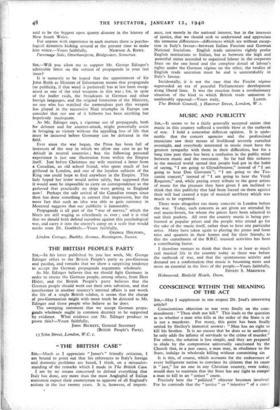" THE BRITISH CASE "
Sit,—Much as I appreciate " Janus's " friendly criticism, I am bound to point out that his references to Italy's foreign and domestic problems are based, I think, on a misunder- standing of the remarks which I made in The British Case.
I am by no means concerned to defend everything that Italy has done, any more than the most Anglophil of Italian statesmen expect their countrymen to approve of all England's actions in the last twenty years. It is, however, of import- ance, not merely in the national interest, but in the interests of justice, that we should seek to understand and appreciate the immense differences--differences which are without excep- tion in Italy's favour,between Italian Fascism and German National Socialism. English trade unionists rightly prefer English institutions to Italian, but as between the high and powerful status accorded to organised labour in the corporate State on the one hand and the complete denial of labour's rights under the German regime on the other, the verdict of English trade unionism must be and is unmistakably in Italy's favour.
Incidentally, it is not the case that the Fascist regime superseded an era of peaceful Parliamentary development along liberal lines. It was the reaction from a revolutionary situation of the kind to which British trade unionism is


































 Previous page
Previous page